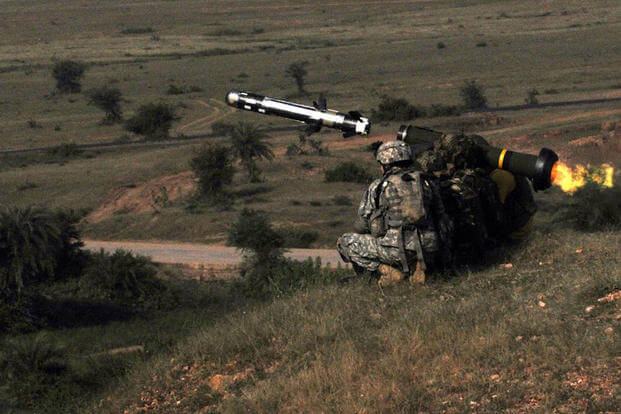Russia's official media Wednesday played up a report that the U.S. may have supplied Javelin anti-tank missiles to Syrian Kurds as the U.S. and Moscow traded accusations ahead of a tentative truce in the civil war that is supposed to start Saturday.
Continued fighting has blocked international aid convoys from reaching some areas, forcing the United Nations World Food Program to resort Wednesday to an airdrop of supplies to the northeastern city of Deir ez-Zor, which has been under siege by the Islamic State of Iraq and Syria, or ISIS.
British diplomat Stephen O'Brien, the UN Under-Secretary for Humanitarian Affairs, told the Security Council, "Earlier this morning, a WFP plane dropped the first cargo of 21 tons of items into Deir ez-Zor." The "high altitude" drop was challenging, he said, but initial reports from teams on the ground indicated that the "pallets have landed in the target area as planned."
It was not immediately clear what type of aircraft was used or which country supplied the plane, but a relief airdrop would not be a first for the UN. Last year, the WFP used a C-130 cargo aircraft from Australia to deliver humanitarian relief to East Timor.
Russia last year claimed to have airdropped relief to Deir ez-Zor. The U.S. military has thus far ruled out airdrops in Syria, where the UN estimates that as many as 500,000 civilians are in need of relief.
The charge about the U.S. supplying Javelins to the Kurds stemmed from a video posted on social media showing a suspected ISIS vehicle being destroyed by a missile near Shaddadi, the northeastern Syrian town that was taken back from ISIS last week by fighters of the U.S. backed Syrian Kurdish Popular Protection Units.
Russia's government-funded RT television said, "If the Kurdish YPG fighters have been armed with Javelin anti-tank missiles by Washington, it is a move that will not go down well with Turkey. Ankara has been shelling YPG forces, which Turkey views as a terrorist organization, as well as government troops on Syrian territory since mid-February."
The Washington Post, which first reported on the video and the possible use of a Javelin, cited State Department spokesman John Kirby as saying that "nothing has changed about our policy of not providing the YPG with weapons." However, the U.S. has coordinated frequent airstrikes in support of the YPG and airdropped ammunition to the group last year in defense of the besieged town of Kobane.
The "fire and forget" FGM-148 Javelin features what is called a "top attack flight profile" designed to hit an armored vehicle from the top where the armor is thinnest. The weapon also can be used in the direct attack mode against buildings and other targets.
Turkey considers the YPG a terrorist organization and has been hitting the group with cross-border artillery fire. The U.S. has also sought to rein in the YPG.
Last week, Army Col. Steve Warren, a spokesman for Combined Joint Task Force-Operation Inherent resolve in Baghdad, called on the YPG to stop fighting with other U.S.-backed rebel groups in Syria.
The latest proposed "cessation of hostilities" in Syria worked out by Russia and the U.S. was expected to begin this Saturday, after a previous "cessation" set for last Friday failed.
However, there were still open questions on how the truce would be implemented and monitored, and which groups among the various rebel factions would agree to cooperate.
In an Oval Office meeting Wednesday with Jordan's King Abdullah II, President Obama said "We are very cautious about raising expectations on this. When Abdullah said he had his "fingers crossed," Obama said "We'll see."
At a news conference Tuesday, Pentagon Press Secretary Peter Cook said that Defense Secretary Ashton Carter had a large "dose of skepticism" on whether Russia would live up to the agreements in the proposed truce.
--Richard Sisk can be reached at Richard.Sisk@Military.com.






























